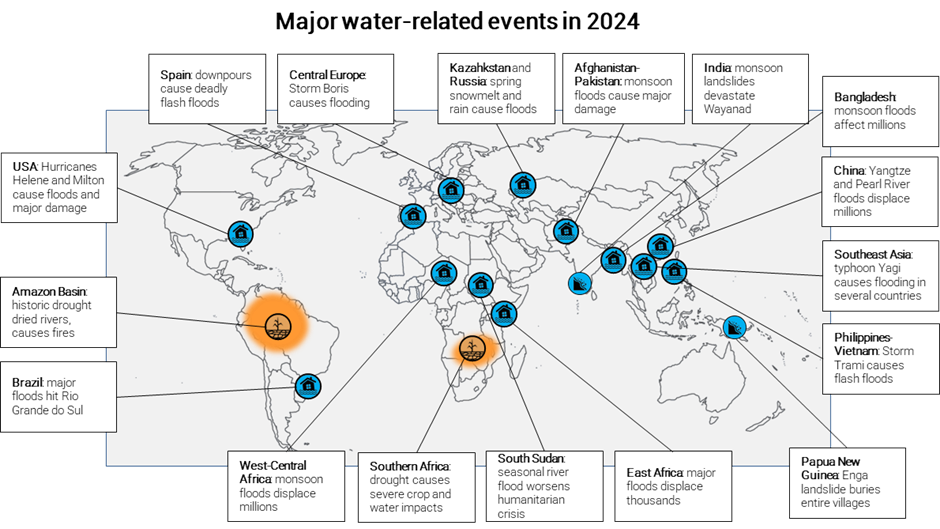 2025-01-07
2025-01-07
2024 is characterized by record breaking high temperatures, unstable rainfall, and a severe water crisis, showcasing the growing impact of climate change on the global water cycle. The 2024 Global Water Monitoring Report released today summarizes that rising temperatures are accelerating the water cycle. This is another hottest year on record, with global water systems bearing the brunt of the impact, "said Professor Albert van Dijk, lead author of the report and from the Australian National University." From historic droughts to catastrophic floods, these extreme events are affecting lives, livelihoods, and entire ecosystems. "In 2024, water related disasters resulted in over 8700 deaths, 40 million people displaced, and economic losses exceeding $550 billion. Scientific attribution studies indicate that many disasters that occur in 2024 are more likely to occur due to the impact of climate change, with their probability approximately doubling. It is worrying that even if we stop emissions today, the temperature rise in the coming decades has already been locked in. We must urgently and significantly reduce emissions, while also preparing for greater impacts.
Global Trends
2024 is the hottest year in the world, with air temperatures over land 1.2 ° C higher than around 2000. 111 countries, accounting for about half of the world's population, experienced their hottest year on record. Record breaking monthly high temperatures occur frequently. Extreme rainfall events, including both heavy and light rainfall, are becoming increasingly frequent. The record breaking number of extremely rainy months in 2024 has increased by 27% compared to around 2000, while the record breaking number of extremely few rainy months has increased by 38%. The Amazon and Zambezi Rivers suffered severe drought, while China's Yangtze River and the Pearl River triggered severe floods.
A planet with a combination of water and heat
The report emphasizes the link between rising temperatures and water crisis. Warm air can hold more moisture, leading to stronger rainfall and floods in some areas, while accelerating evaporation and drying in others. This dual effect exacerbates drought, flash floods, and other water related disasters. Heat and water are closely related, and this year's extreme events have shown how they amplify each other, "said Professor Van Dijk. The drought in the Amazon has triggered fires that release greenhouse gases, further accelerating climate change. This issue has long been a concern for scientists, but it is no longer a distant future - it is happening and the situation is worsening.
A catastrophic year
The report also summarizes the global impact of water related disasters in 2024. River floods, especially in West and Central Africa, have displaced over 13 million people and exacerbated widespread food insecurity. Mountain floods and landslides have caused tens of thousands of deaths, with major events in Asia and Papua New Guinea accounting for the majority of the fatalities. Tropical cyclones alone have caused global economic losses exceeding $400 billion, particularly in the United States and Southeast Asia. The drought in southern Africa has led to a halving of corn production, leaving over 30 million people facing food shortages. The drought in the Amazon basin has caused profound damage to the ecosystem, with over 42000 square kilometers of forests burned down in September 2024. Asia has suffered major impacts from catastrophic events, including Typhoon Yagi, Afghanistan Pakistan floods, and severe landslides in India. Southern Africa has experienced extreme drought, while floods from West to East Africa have set records. The Amazon basin has experienced unprecedented drought and fires, while the United States has suffered record losses due to hurricanes. Storm Boris submerged the central and eastern regions, causing billions of dollars in losses, while highly localized flash floods in Spain claimed many lives.

Looking ahead to the future
Due to past emissions locking in future climate warming, the frequency and intensity of extreme events are bound to increase. However, for every additional ton of greenhouse gas emissions, future heatwaves, floods, and droughts will become even more severe, "warned Professor Van Dijk." Water is our most important resource, and its extreme forms - whether floods or droughts - are one of the biggest threats we face.